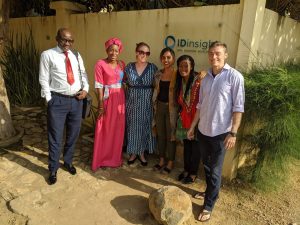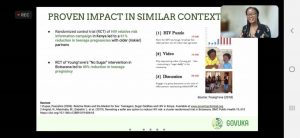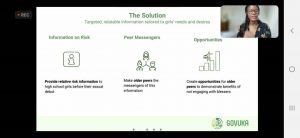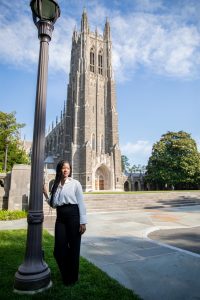From Philile: Why, how, what – the questions shaping my Applied Field Experience and path to impact
The Why
I was first introduced to the concept of the Why during an Innovation and Entrepreneurship class I took in Spring 2021 called New Ventures: Development. The “Why” comes from the Golden Circle, a concept developed by author and inspirational speaker, Simon Sinek, who says, “People don’t buy what you do or how you do it, they buy why you do it.” So ultimately, people are inspired by your purpose and less so by the things you do, which can change. So, when talking about your business or venture, you want to start by articulating your why, followed by the how and finally ending with the what. This is a very compelling concept to me, a new social entrepreneur, but even more compelling as I think about how best to shape my Applied Field Experience (AFE). In other words, how am I leveraging the lessons and skills from my professional experiences and academic work to define my purpose and desired long-term impact?
Getting at the How
For my Applied Field Experience, I am working on two projects: launching my own non-profit, Govuka, whose mission is to “improve the wellbeing and economic outcomes of adolescent girls by demonstrating the benefits of not engaging in intergenerational relationships” in Eswatini and interning as a Graduate Research Assistant at the UNC Gillings School of Global Public Health. My work at UNC involves ensuring data quality and conducting preliminary analysis for a study exploring the effects of intimate partner violence on the access to HIV care for pregnant adolescent women in Johannesburg, South Africa.
There is so much synergy between my work with Govuka and research at UNC. Govuka’s ultimate goal is to significantly reduce teenage pregnancies and new HIV infections among adolescents in Eswatini, while our research at UNC is exploring how we might better deliver care to pregnant teenage mothers experiencing violence in some way. The insights gathered from deeply studying at-risk youth is informing Govuka’s approach to delivering sexual health education so that it is tailored to the realities of young people in Southern Africa. While Govuka’s focus is on preventing early and unwanted pregnancy and HIV infection, I am also learning a lot about how healthcare providers and communities at large can provide support to at-risk youth through arts-based therapy. For example, one of my first tasks has been to research and put together a training manual on arts-based therapeutic approaches for lay health workers who will be conducting sessions and collecting quantitative and qualitative data from study participants. These therapeutic skills are limited and not well understood in this context, leading us to be more creative in our training approach. My supervisor, Dr. Abigail Hatcher and I, are considering making a series of videos to demonstrate how to facilitate these sessions, so that we are not just telling trainees but also showing them how they might facilitate their sessions.
My internship is also sharpening Govuka’s Why because I now understand how little insight and research there is into adolescent sexuality, pregnancy, HIV care and mental health in Southern Africa. We are in the privileged position of directly interacting with the greatest experts on these topics — adolescents themselves. As Govuka’s programming ramps up in the next couple of months, we are excited for the opportunity to learn – from girls – what their needs and desires are during what can be one of the most challenging periods of their lives.
Excited for the WHAT
Govuka was born out a need to deliver a data-driven solution to a huge problem that I had identified in my country: high teenage pregnancy and high HIV incidence among girls aged 15-24 (in Eswatini girls are more than 2 times likely to get newly infected with HIV compared to boys the same age). Armed with evidence from Kenya and Botswana, I made a few calls in Eswatini and submitted a proposal to D-Prize to implement a similar intervention (that is, teach girls a one-hour anti-sugar daddy class that informs them about the relative higher risk of HIV infection with older men). In February of 2021, D-Prize awarded Govuka seed funding to bring this proven solution to Eswatini.
While we were excited to launch our pilot program in-person this summer, the ongoing third wave of coronavirus infections in Southern Africa made it unsafe to do so. But as true innovators, we have taken our mission to a digital platform which will be smaller in scale but will ensure we are still making strides to engage young people and achieve impact. This is also giving us an opportunity to learn from young people and pivot our model and approach (if needed) before we pilot fully in-person next year. Our focus this summer is three-fold: (1) Develop and publish content for our digital launch on Facebook and Instagram, (2) Secure and finalize strategic partners in Eswatini and (3) Raise more funding for Govuka’s pilot and beyond.
- Our digital launch is now live on Facebook and Instagram and focuses on delivering our Why-How-What in a 3-part series. I’ve enjoyed working closely with our Communications Director to develop Govuka’s narrative and brand. I’ve gained critical skills in website development and copy-editing.
- Govuka has identified and engaged two partners to help realize our mission in Eswatini: the Swaziland Action Group Against Abuse (SWAGAA) and the Ministry of Education and Training. While we have emails of intent from these organizations, we are working with them to finalize our partnerships through signed Memorandums of Understanding so we have the necessary authorization to work in schools early next year.
- We are also continuing to pitch our vision to investors through connections and competitions organized through Duke’s Innovation and Entrepreneurship Initiative (I&E). Earlier this month, Govuka participated in the Fowler’s Global Social Innovation Challenge which was held virtually this year. We were among 12 Finalists out of more than 40 global teams and were awarded the Women Innovator Award. I reflect on my experience in the competition in this article. We are continuing to research more opportunities to share our vision and raise additional funding over the next few months.
Philile Shongwe pitching to a panel of judges during the finals of the Fowler’s Global Social Innovation Challenge via Zoom
Looking ahead and long-term impact
For as long as I can remember, I’ve felt that my purpose is to serve others through teaching and mentorship. But over the years, I have come to realize that great teachers are in fact great learners themselves — a realization that has steered my career more towards research in the past few years. Before coming to Duke to pursue my Master of International Development Policy (MIDP), I had spent several years doing development research consulting for clients ranging from small non-profits to national governments in East and West Africa. Our goal was to help our partners use data and evidence to inform their program decisions.
 Philile (second-right) with colleagues after Field Manager training in Dakar, Senegal
Philile (second-right) with colleagues after Field Manager training in Dakar, Senegal
However, rigorous program evaluation is not a silver bullet but rather one of many insights into what might be happening in the world. My interest in social innovation stems from my desire to constantly learn about what works and having the ability to innovate and change my approach based on this learning. Looking ahead to my final year at Duke, I want to continue to hone my skills as a social entrepreneur and devote my thinking towards identifying the right pain points and potential solutions for adolescent wellbeing through my Master’s Project. Upon graduating I want to continue to grow Govuka’s mission and potentially pursue further studies in Public Health to deepen my abilities to observe and generate insights that can be used by the broader global public health community.
Appreciating the beauty of Duke’s Chapel and all the amazing opportunities to learn and grow the past year


